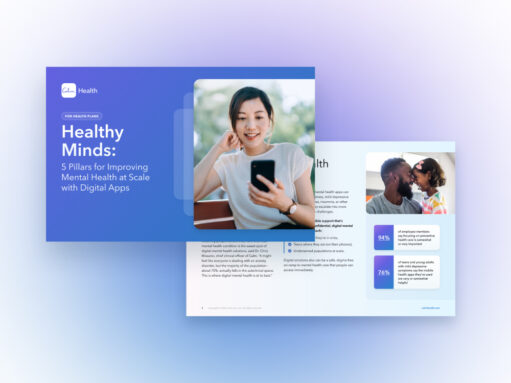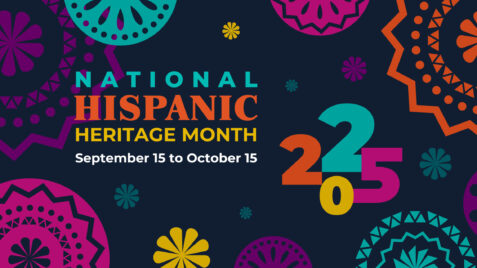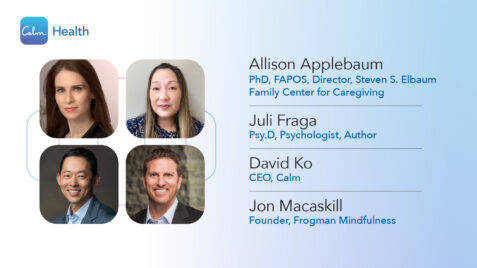Clinically reviewed by Chris Mosunic, PhD, RD, MBA, Chief Clinical Officer, Calm
TL;DR
- Underserved populations face significant barriers to accessing timely and appropriate mental health support.
- There are many underserved populations, including people who face chronic discrimination, people with occupational stress and trauma, and people with chronic health conditions.
- To improve mental health access and outcomes at scale, health plans and employers can implement digital mental health support that’s evidence-based, easy to access, culturally relevant, and targeted to the specific needs of these underserved groups.
Despite widespread efforts to improve access to mental health care, too many people are left untreated. In the US in 2024, for example, more than 61 million people had a mental illness in the past year, but only about half (52.1%) received mental health treatment.
The gap is worse for members of underserved populations—individuals and communities who face significant barriers to accessing mental health support. For instance, in 2024, 35% of Asian Americans with any mental illness and 44% of Black or African Americans with any mental illness received mental health support in the past year, compared to 59% of White Americans of the same category.
When it comes to mental health support, however, marginalized communities aren’t the only underserved populations. Unfortunately, many groups commonly experience both mental health challenges as well as barriers to mental health support. These groups include
- Communities who experience chronic discrimination,
- People with chronic conditions, such as heart disease, diabetes, or cancer, and
- People with occupational stress and trauma.
To drive improvements in mental health access and outcomes at scale, health plans and employers can adopt digital mental health apps that address the distinct needs of these communities.
Addressing the unique challenges of communities facing discrimination
A person’s mental health is inextricably linked to their life experience and physical health. For example, Black people experience higher levels of daily and chronic stressors—such as exclusion, microaggressions, or bullying—which puts them at higher risk of stress, anxiety, depression, and substance-use disorders. Prolonged stress, in turn, makes them more susceptible to stress-related illnesses, such as hypertension and cardiovascular disease.
Similarly, amid growing hostility in the political and social landscape, LGBTQ+ people are at higher risk of mental distress, depression, suicide, and cardiovascular disease.
These and other marginalized communities commonly face a wide range of barriers to care, including bias, stigma, and a lack of culturally relevant support. Even though the Hispanic and Latino community represents the largest non-White community in the US, for instance, only 14.5% of mental health apps have Spanish-language operability.
To better support these underserved populations, health plans and employers can look for digital mental health apps that provide
- Support from psychologists who specialize in culturally relevant care;
- Content that speaks directly to the health experiences of Black, LGBTQ+, and other communities facing chronic stressors;
- Broad native-language support; and
- Content from diverse authors and narrators in a variety of formats that offer a stigma-free on-ramp to mental health.
For example,
- Calm Health’s Hypertension & Health for Your Black Wellness is an evidence-based Calm Health stress-management program designed to foster well-being among Black people with hypertension through evidence-based, culturally relevant exercises.
- Thrive with Pride: Self-care for LGBTQ+ Folks is a Calm Health evidence-based program developed by Dr. S.H. Moon, an LGBTQ+ clinical psychology specialist, consultant, educator, and writer, specializing in BIPOC and LGBTQIA+ mental health.
- Calm Health includes the best of Calm mindfulness content featuring more than 40% BIPOC (Black, Indigenous, and People of Color) representation. People can access Calm Dailies, meditations, wisdom, Sleep Stories, soundscapes, and music without concerns of stigma.
In honor of Hispanic Heritage Month, see our blog that highlights a selection of culturally relevant resources to support the mental well-being of Hispanic and Latinx employees.
Digital mental health apps can play a vital role in supporting underserved populations
Learn how
Supporting the mental health of people with occupational stress and trauma
People facing occupational stress and trauma represent another underserved population when it comes to mental health support. Military personnel, first responders, healthcare workers, and veterinarians, for example, are among the professionals who are exposed to long or irregular work hours, high-stress environments, and traumatic events.
- Heavy patient loads, excessive working hours, and the burden of too many administrative tasks are some of the major stressors affecting the mental well-being of healthcare professionals. Almost two-thirds of nurses (65%) and nearly half of physicians (47%) report experiencing burnout, a state of emotional and physical exhaustion.
- Eight of 10 firefighters responding to a survey reported exposure to traumatic events such as severe human suffering, life-threatening illness, and suicide. Repeated exposure to critical incidents tests the resilience of firefighters and can negatively affect their mental health and well-being.
- One in four of the 16.2 million veterans in the US today meet the diagnostic criteria for a mental health concern and one in 10 struggle with multiple conditions. According to the National Alliance on Mental Illness, an average of 20 veterans die by suicide each day.
Yet shame, stigma, time constraints, lack of available resources, and fear of disciplinary action keep many professionals from getting timely or appropriate mental health support. Members of the military often fear seeking mental health support due to potential impacts on their active-duty status, for example. Similarly, many physicians avoid seeking mental health care due to state regulations that can restrict their ability to practice if diagnosed or undergoing treatment.
Health plans and employers looking to help to improve mental health at scale can better support these professionals by adopting digital mental health apps that
- Are developed by psychologists with expertise in the unique challenges faced by first responders, healthcare workers, caregivers, and other high-stress occupations.
- Don’t require a diagnosis or prescription to use.
- Can be accessed easily from any location.
- Provide essential information to people about the challenges of their roles.
For example, Mental Fitness for Fire & EMS Professionals, authored for Calm Health by Patricia Watson, Ph.D., is an evidence-based program that offers insights and practical advice to support firefighters and EMS professionals with the challenges that come with first-responder life. The program’s brief episodes are accessible anytime, anywhere—via a smartphone or browser—which allows first responders to integrate support into their hectic daily schedules.
Dr. Watson has been a psychologist at the National Center for PTSD since 1998 and previously served eight years as an active-duty Navy psychologist. She co-authored Stress First Aid models for various high-risk occupations and helped develop multi-tiered mental health programs for first responders.
Calm Health also offers programs to support the mental health of nurses, physicians, active military, veterans, caregivers, veterinarians, and other people at risk for occupational stress and trauma.
People with chronic conditions need better mental health support
More than half (52%) of employee respondents to a One Medical survey are struggling with at least one chronic condition. Unfortunately, most people with chronic conditions are not receiving the mental health support they need.
People with diabetes are three times more likely to struggle with depression, but only 25% to 50% are diagnosed and treated for it, for example. Or they might be receiving treatment but not from a mental health provider who specializes in their condition.
To help close this gap, health plans and employers can look for digital mental health solutions that
- Are created by psychologists with deep subject-matter expertise in specific conditions, such as cancer, diabetes, hypertension, and chronic pain.
- Connect with listeners about the mental and emotional side of their condition with empathy and authenticity.
- Offer practical tools and strategies that listeners with a chronic condition can incorporate into their daily lives. Nearly three-quarters of employees who have a chronic condition want to manage it with lifestyle changes rather than medications alone.
Calm Health offers programs designed specifically to support the mental health and well-being of people with chronic conditions, including cancer, heart disease, Type 1 diabetes, Type 2 diabetes, obesity, chronic pain, anxiety, and depression. Developed by psychologists with deep subject matter expertise in the conditions, these programs are based on principles of cognitive behavioral therapy and have an average 4.5 out of 5 user rating, helping boost long-term user engagement.
Screenings and support for sleep and resilience are vital, too
In addition to clinical programs, mental health screenings and support for sleep and mindfulness are also vital to improving the mental well-being of underserved groups.
- Calm Health’s mental health screening is available 24/7 via a smartphone or web browser, allowing people to better understand their mental health. Calm Health uses a person’s screening results, along with their self-reported conditions, goals, and topics of interest, to recommend specific clinical programs and mindfulness content. Guiding people to targeted support is an essential first step to improving mental health engagement and outcomes.
- Studies have shown a strong bi-directional relationship between sleep, mental health and chronic disease. For example, insomnia and other sleep issues are linked to cardiovascular disease, Type 2 diabetes, depression, anxiety, and other conditions. For this reason, health plans and employers should look for digital mental health apps like Calm Health that offer an extensive library of content, including soundscapes and sleep stories, to support people in getting healthy sleep.
- Providing access to mindfulness resources is also important to improve the mental well-being of underserved and other populations. For individuals facing chronic health conditions, occupational trauma, or discrimination, mindfulness may help reduce stress and build resilience by fostering awareness of the present moment and of how one is feeling, without judgment. Calm Health provides a wide range of mindfulness programs, such as breathing exercises, wisdom, meditations, music, and soundscapes.
For more information about supporting the mental health of underserved and other populations, download our e-book, Healthy Minds: 5 Pillars for Improving Employee Mental Health at Scale with Digital Apps.




